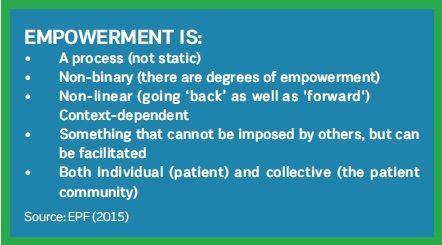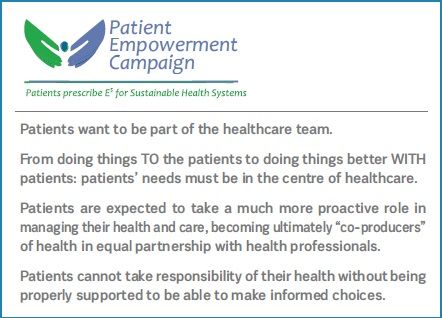HealthManagement, Volume 15 - Issue 3, 2015
As European health services face an ageing population and an increase in chronic diseases, the challenge is to make healthcare sustainable. There is already a mismatch between available services and patient needs across the healthcare continuum, and many patients face fragmentation of care. Patient empowerment is one way to address this gap in moving from disease-centred to patientcentred care. The European Patients Forum (EPF) calls for the development of a strategy on this topic to make it a priority at EU-level, including an action plan on health literacy and high-quality information for patients on all aspects of their care.
The rise in patients living with chronic disease necessitates a shift in delivery from disease-centred to patient- and familycentred services. This approach combines self-management in the community with well-integrated professional support across the life span. It implies the empowerment of patients and their involvement at every level in the health system, ensuring active patient participation in policymaking and in co-designing of care services to meet their needs more effectively.

What is Empowerment?
EPF uses the definition that was developed for the EU Joint Action on Patient Safety and Quality of Care (www.pasq.eu). Empowerment is “a multi-dimensional process that helps people gain control over their own lives and increases their capacity to act on issues that they themselves define as important.” Collective empowerment is “a process through which individuals and communities are able to express their needs, present their concerns, devise strategies for involvement in decision-making, and take political, social, and cultural action to meet those needs” (adapted from Luttrell et al. 2009 and the DUQuE “Deepening our understanding of quality improvement in Europe” project - www.duque.eu).
Empowerment is a process that is not necessarily continuous. Patients can feel empowered in one setting and unempowered in another, depending on the healthcare staff and organisational structures they encounter. Empowerment requires a shift from patients passively receiving healthcare to being active in and taking responsibility for their own healthcare and sharing the decision-making process with health professionals. Patients need access to high-quality information to be “health literate” and therefore make informed choices about their healthcare, and health professionals need the skills to work in partnership with patients.
One Size Does Not Fit All
Patient empowerment cannot be imposed, but it can be facilitated. In some circumstances, patients may not wish to be empowered, and prefer to leave decision-making to the health professional. In other circumstances, such as emergencies, patients may be unable to be actively involved. There may also be cultural differences amongst patients.
Equity of access and patient empowerment are closely interlinked. However, there is a risk that the style of empowerment approaches, if not carefully implemented, may worsen existing inequalities.
EPF’s position is that equity and empowerment are system issues: health systems and services should be designed to be empowering for all users, including disadvantaged or socially excluded patients. Application of patients’ rights and human rights generally should be ensured, such as meaningful informed consent focusing on the patient’s ability to make meaningful choice, rather than on legal protection of healthcare staff; effective mechanisms should be in place to ensure non-discrimination, both within and outside the health system.
EPF is developing a strategy to explore empowerment from the point of view of potentially vulnerable, socially excluded or marginalised groups, and to propose measures for ensuring patient organisations are inclusive. At system level, health inequalities need to be addressed via a comprehensive “Health Inequalities in all Policies” approach, including targeted strategies (for example health literacy) for specific groups.
EPF Patient Empowerment Campaign
The European Patients Forum (EPF) has as one of its goals to promote the development and implementation of strategies and healthcare services that empower patients to be involved in the decision-making and management of their condition according to their preference, whilst raising awareness about their rights. EPF represents the interests of over 150 million patients across Europe.
In 2014 the European Commission commissioned the mapping study Empowering Patients in the Management of chronic disease (EMPATHiE) (EMPATHiE Consortium 2014), which aimed to better understand the concept of patient empowerment and to identify good practices, success factors and barriers across the European Union (EU). EPF led a work package that explored different scenarios for future European cooperation, revealing a strong need and desire for a patient empowerment European strategy.
In May 2015 EPF launched its Europe-wide patient empowerment campaign with the aim of promoting understanding of what patient empowerment means from the patient perspective among European political decision-makers and health stakeholders. EPF further calls on the European institutions to adopt an EU strategy on this topic relating to all aspects of health, from health promotion and prevention through to therapeutic options and self-management of chronic disease. Patients expect a strong commitment from EU decision-makers and health stakeholders to promote the empowerment and meaningful involvement of patients as equal and respected partners in the ‘healthcare team’. The empowerment approach aims to realise the vision of patients as ‘co-producers” of health and as integral actors in the health system in partnership with the healthcare professional.
At the campaign launch conference on 20-21 May 2015 in Brussels, the participants took the first steps to formulate a “Charter of Patient Empowerment”, the fundamental principles of patient empowerment in 10 points. The work on this Charter will in turn feed into the drafting of a multi-stakeholder Roadmap to Patient Empowerment that will provide the basis for concrete actions to be taken by European policymakers and healthcare stakeholders. EPF is also identifying best practices in patient empowerment and involvement for knowledge sharing and mutual learning. The Charter and Roadmap will be released in November 2015.

Patients Prescribe – The Five Es
“Patients prescribe E5 for sustainable health systems” is the tagline of the EPF campaign to show that patients are active people who can, if supported, and according to their individual capabilities and situation, make a difference for the sustainability of healthcare systems. EPF also encourages supporters to use the Twitter tag #PatientsprescribE.

The five “Es” of Empowerment are Education, Expertise, Equality, Experience, and Engagement.
1. Education
Patients can make informed decisions about their health if they are able to access all the relevant information, in an easily understandable format.
2. Expertise
Patients self-manage their condition every day so they have a unique expertise on healthcare which needs to be supported.
3. Equality
Patients need support to become equal partners with health professionals in the management of their condition.
4. Experience
Individual patients work with patient organizations to represent them, and channel their experience and collective voice.
5. Engagement
Patients need to be involved in designing more effective healthcare for all and in research to deliver new and better treatments and services.
Doing Things Better WITH patients
It is widely acknowledged that empowering patients is good for healthcare systems as it brings better health outcomes. Empowered patients take responsibility for their care in equal partnership with health professionals,
take preventive measures, seek earlier diagnosis and adhere to treatment,which can reduce healthcare costs in the
long run (Stone 2008).
Patient empowerment is a key element of future high-quality, patient-centred health systems. The slogan EPF has chosen for its campaign - Patients Prescribe – says it all: for the first time ever at EU level the patients drive a campaign on their empowerment. They are no longer passive, but are active, decisive and assertive people, ready
to play their rightful role at collective and individual level. They call on EU decisionmakers to develop an EU strategy on patient empowerment to achieve a real impact on the ground for the benefit of the 150 million patients with chronic disease whose interests EPF represents.
Further Information
To engage in the campaign, please visit www.eu-patient.eu/campaign/PatientsprescribE/ or contact [email protected]
References:
EMPATHiE Consortium (2014) EMPATHiE final summary report. [Accessed: 20 July 2015] Available from http://ec.europa.eu/health/patient_safety/docs/empathie_frep_en.pdf
European Patients Forum (2015) EPF background brief: patient empowerment. [Accessed: 20 July 2015] Available from http://www.eu-patient.eu/globalassets/campaign-patient-empowerment/epfbriefing-paper--patient-empowerment.pdf
Luttrell C, Quiroz S, Scrutton C et al. (2009) Understanding and operationalising empowerment. London: Overseas Development Institute.[Accessed: 29 July 2015] Available from http://www.odi.org/sites/odi.org.uk/files/odi-assets/publications-opinion-files/5500.pdf
Stone S (2008) A retrospective evaluation of the impact of the Planetree patient centered model of care program on inpatient quality outcomes. Health Environments Research and Design Journal, 1(4): 55-69.


